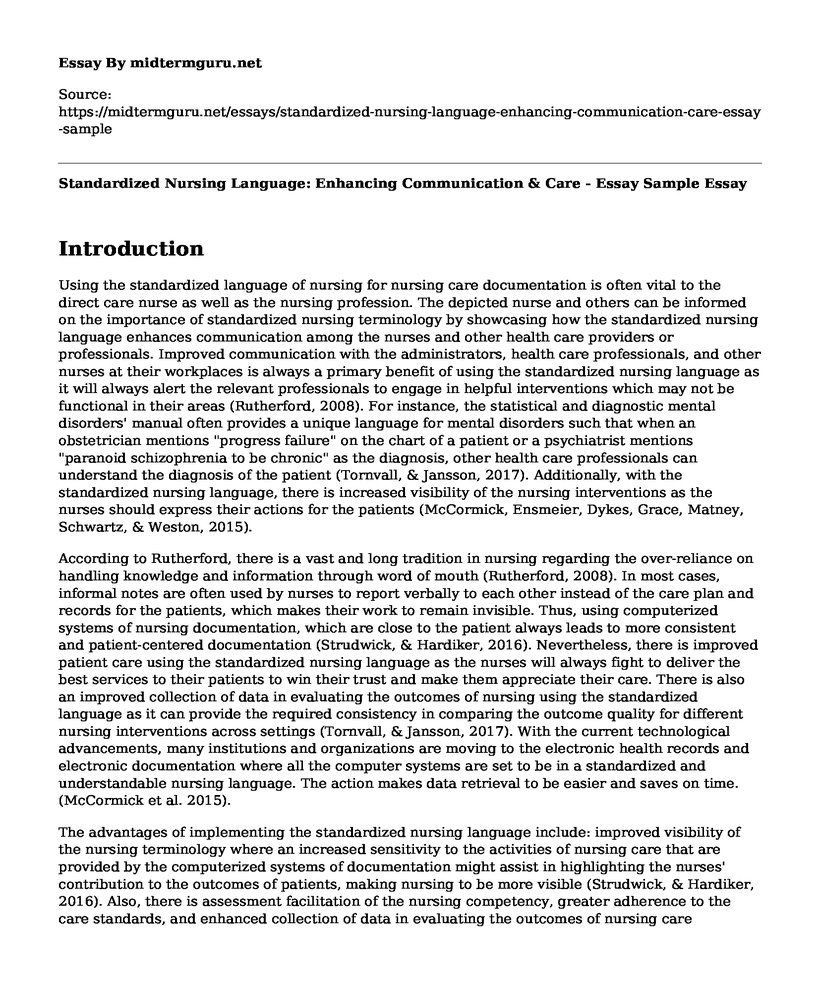Introduction
Using the standardized language of nursing for nursing care documentation is often vital to the direct care nurse as well as the nursing profession. The depicted nurse and others can be informed on the importance of standardized nursing terminology by showcasing how the standardized nursing language enhances communication among the nurses and other health care providers or professionals. Improved communication with the administrators, health care professionals, and other nurses at their workplaces is always a primary benefit of using the standardized nursing language as it will always alert the relevant professionals to engage in helpful interventions which may not be functional in their areas (Rutherford, 2008). For instance, the statistical and diagnostic mental disorders' manual often provides a unique language for mental disorders such that when an obstetrician mentions "progress failure" on the chart of a patient or a psychiatrist mentions "paranoid schizophrenia to be chronic" as the diagnosis, other health care professionals can understand the diagnosis of the patient (Tornvall, & Jansson, 2017). Additionally, with the standardized nursing language, there is increased visibility of the nursing interventions as the nurses should express their actions for the patients (McCormick, Ensmeier, Dykes, Grace, Matney, Schwartz, & Weston, 2015).
According to Rutherford, there is a vast and long tradition in nursing regarding the over-reliance on handling knowledge and information through word of mouth (Rutherford, 2008). In most cases, informal notes are often used by nurses to report verbally to each other instead of the care plan and records for the patients, which makes their work to remain invisible. Thus, using computerized systems of nursing documentation, which are close to the patient always leads to more consistent and patient-centered documentation (Strudwick, & Hardiker, 2016). Nevertheless, there is improved patient care using the standardized nursing language as the nurses will always fight to deliver the best services to their patients to win their trust and make them appreciate their care. There is also an improved collection of data in evaluating the outcomes of nursing using the standardized language as it can provide the required consistency in comparing the outcome quality for different nursing interventions across settings (Tornvall, & Jansson, 2017). With the current technological advancements, many institutions and organizations are moving to the electronic health records and electronic documentation where all the computer systems are set to be in a standardized and understandable nursing language. The action makes data retrieval to be easier and saves on time. (McCormick et al. 2015).
The advantages of implementing the standardized nursing language include: improved visibility of the nursing terminology where an increased sensitivity to the activities of nursing care that are provided by the computerized systems of documentation might assist in highlighting the nurses' contribution to the outcomes of patients, making nursing to be more visible (Strudwick, & Hardiker, 2016). Also, there is assessment facilitation of the nursing competency, greater adherence to the care standards, and enhanced collection of data in evaluating the outcomes of nursing care (Rutherford, 2008). On the other hand, there are challenges faced by using the standardized nursing language. Differentiating the contribution of nursing to care of patients from those of medicine, and nursing care incorporation into the health record in a commensurate way with its significance to the welfare of the patients are the two major challenges faced (Rutherford, 2008). Health professionals should identify the best way of incorporating the nursing care elements into electronic health records so that standardized technologies can capture the independent contribution of nursing, which reflects the uniqueness of nursing care. For instance, when entering the health history of a patient, the name of the health care provider should be indicated for future referencing or appreciation by the patient in case of quality services offered (McCormick et al. 2015).
References
McCormick, K., Sensmeier, J., Dykes, P., Grace, E., Matney, S., Schwartz, K., & Weston, M. (2015). Exemplars for advancing standardized terminology in nursing to achieve sharable, comparable quality data based upon evidence. On-Line Journal of Nursing Informatics, 19(2). Retrieved from https://search.proquest.com/openview/cbc598964e15f1298829b4035c7ac1d7/1?pq-origsite=gscholar&cbl=2034896
Rutherford, M., (Jan. 31, 2008). "Standardized Nursing Language: What Does It Mean for Nursing Practice? "OJIN: The Online Journal of Issues in Nursing. Vol. 13 No. 1. Doi: 10.3912/OJIN.Vol13No01PPT05
Strudwick, G., & Hardiker, N. R., (2016). Understanding the use of standardized nursing terminology and classification systems in published research: A case study using the International Classification for Nursing Practice. International journal of medical informatics, 94, 215-221. Doi: 10.1016/j.ijmedinf.2016.06.012
Tornvall, E., & Jansson, I. (2017). Preliminary evidence for the usefulness of standardized nursing terminologies in different fields of application: a literature review. International journal of nursing knowledge, 28(2), 109-119. Doi: 10.1111/2047-3095.12123
Cite this page
Standardized Nursing Language: Enhancing Communication & Care - Essay Sample. (2023, Jan 24). Retrieved from https://midtermguru.com/essays/standardized-nursing-language-enhancing-communication-care-essay-sample
If you are the original author of this essay and no longer wish to have it published on the midtermguru.com website, please click below to request its removal:
- Essay on Clinical Scholarships for the DNP Programs
- Essay on WIC (Women, Infant, and Children) Program: Pregnant Women With Anemia
- Paper Example on Pathophysiology of Diabetes Mellitus
- Research Paper on Nursing Care Transformation
- Annotated Bibliography on Moral Distress and Critical Care Nurses
- Managing Cancer Risk: Smoking and Avoids Relapse - Essay Sample
- Nursing Priorities: Ranking NAND-Approved Diagnoses - Essay Sample







